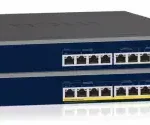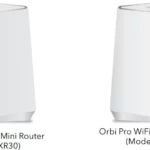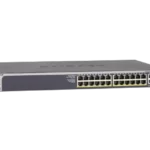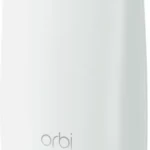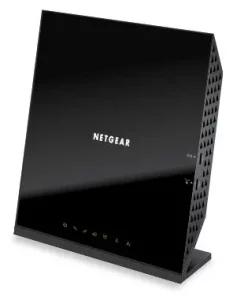

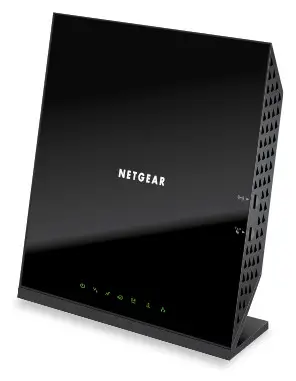
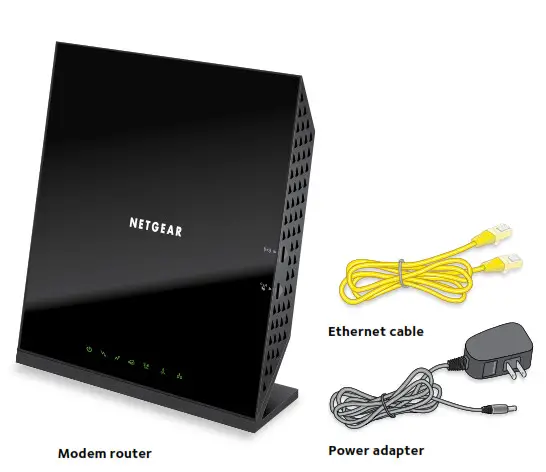
You can use this diagram to connect your modem router or follow the detailed instructions in this booklet.
- Collect your cable Internet provider information.
Collect your cable account number, account phone number, and login information (your email address or user name and password). - Turn off existing modems and routers.
If you are replacing a modem that is currently connected in your home, unplug the modem and plug the new modem router into the same cable wall outlet. - Connect a coaxial cable.
Use a coaxial cable that is provided by your cable company to connect the cable port on the modem router to a cable wall outlet or a line splitter.
Make sure that the cable is tightly connected.
Note: For Comcast XFINITY cable Internet service, Comcast XFINITY recommends connecting your modem router directly to a cable wall outlet. - Connect the power adapter.
Connect the modem router to the power adapter that was included in the package and plug the power adapter into an electrical outlet.
When the startup procedure is completed, the Power LED lights green.
lights green.
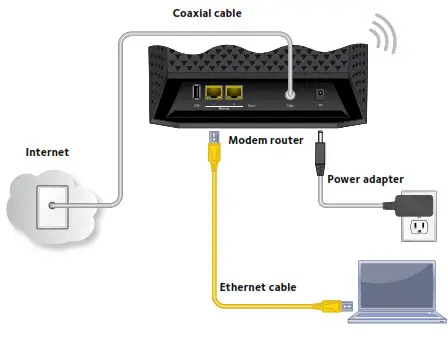
- Wait for the modem router to come online.
The modem router comes online when the Internet LED stops blinking and lights solid green. This process might take up to 10 minutes.
stops blinking and lights solid green. This process might take up to 10 minutes.
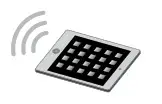
- Connect a computer or WiFi device to the modem router.
To connect using a WiFi connection, use the WiFi network name (SSID) and password on the product label.
To connect using a wired connection, use an Ethernet cable to connect a computer to a yellow Ethernet port on the modem router. Reboot the computer. - Log in to the modem router.
Launch a web browser and enter http://routerlogin.net or http://192.168.0.1 in the address field of the web browser.
When prompted, enter admin for the user name and password for the password. - Activate your Internet service.
For information about how to activate your Internet service, see Activate Your Internet Service on page 6.
The free NETGEAR genie app lets you easily monitor, connect, and control your home network from a Windows or Mac computer, tablet, or smartphone. You can share and stream music or videos, diagnose and repair network issues, set up parental controls, and more:
- Access your modem router and change its settings or diagnose and repair network issues.
- Make a printer AirPrint compatible so that you can print from an iPad or iPhone.
- Use MyMedia to find and play media files in your network.
- Use Turbo Transfer to quickly send files from your computer or smartphone to another device on the network.
- Set up parental controls.
- Connect your smartphones and tablets to your home WiFi by scanning the WiFi QR code from a genie.
Download the free genie app from www.netgear.com/genie.
The LEDs on the modem router light to indicate modem router activity:
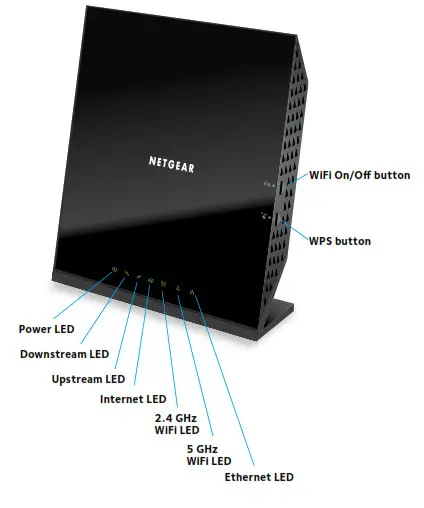
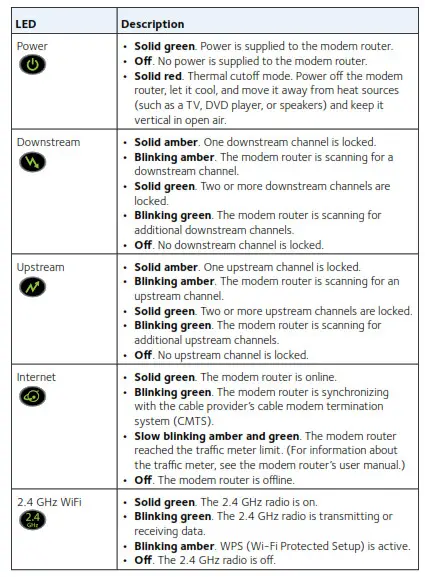
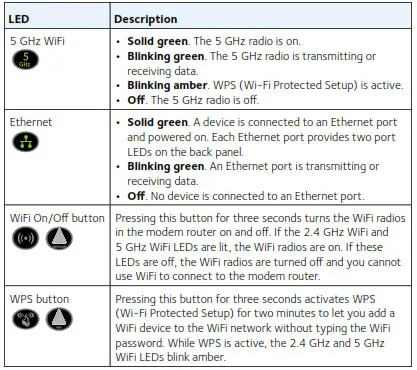

- Collect your cable Internet provider information.
Collect your cable account number, account phone number, and login information (your email address or user name and password). - Turn off existing modems and routers.
If you are replacing a modem that is currently connected to your home, unplug the modem and plug the new modem router into the same cable wall outlet. - Connect a coaxial cable.
Use a coaxial cable that is provided by your cable company to connect the cable port on the modem router to a cable wall outlet or a line splitter.
Make sure that the cable is tightly connected.
For Comcast XFINITY cable Internet service, Comcast XFINITY recommends connecting your modem router directly to a cable wall outlet. - Connect the power adapter to the modem router and plug the power adapter into an electrical outlet.
When the startup procedure is completed, the Power LED lights green.
lights green.
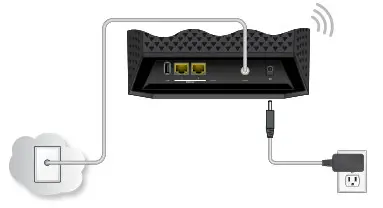
- Wait for the modem router to come online.
The modem router comes online when the Internet LED stops blinking and lights solid green.
stops blinking and lights solid green.
This process might take up to 10 minutes. - Connect a computer or WiFi device to the modem router.
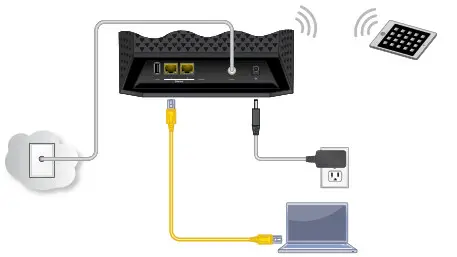
To connect with WiFi, use the WiFi network name (SSID) and network key (password) on the product label.
To connect using a wired connection, use an Ethernet cable to connect a computer to a yellow Ethernet port on the modem router.
Reboot the computer. - To log in to the modem router, launch a web browser.
- In the address field of the web browser, enter
http://www.routerlogin.net or http://192.168.0.1. - When prompted, enter admin for the user name and password for the password.
- Activate your Internet service.
For more information, see Activate Your Internet Service on page 7. If your cable Internet provider is Comcast XFINITY, see Comcast XFINITY Self-Activation on page 9.
- Visit your cable Internet provider’s website and follow the onscreen instructions to activate your Internet service.
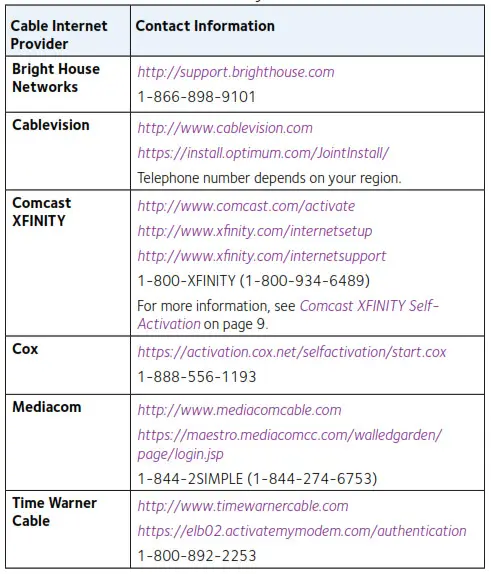
Note: You can also find the contact information in your monthly Internet service billing statement. - If you are unable to activate your Internet service using the instructions on your cable Internet provider’s website, call your cable Internet provider and do the following:
a. When asked, provide your account information and provide the modem router’s model number, which is C6250, serial number, and MAC address.
The serial number and MAC address are on the product label, which is on the bottom of the modem router.

- Wait for your cable Internet provider to confirm that your modem router is active.
- If you do not get an Internet connection with the modem router, ask your cable Internet provider to look for your modem router online, and do one of the following depending on what your cable Internet provider tells you about your modem router:
• If the modem router is not visible, your cable Internet provider can give you instructions to verify why the modem router does not connect with your high‑speed Internet service.
• If the modem router is visible to your cable Internet provider, reboot the modem router. Check your online status again.
Activate your Internet service by using Comcast XFINITY’s self‑activation process. If you are unable to self‑activate your cable modem, call Comcast XFINITY customer service.
Before you start the self‑activation process, make sure that your account number, account phone number, and login information (your email address or user name and password) are nearby.
To activate your Internet connection with Comcast XFINITY’s self-activation process:
- Close all web browsers.
- Launch a web browser.
You are redirected to the XFINITY self‑activation page. If you are not redirected to the XFINITY self‑activation page, visit www.comcast.com/activate. - Provide your XFINITY credentials and complete the self‑activation process.
This process might take up to 15 minutes, during which the modem router reboots a couple of times. - If you are unable to activate your modem router using the XFINITY self‑activation process, call Comcast XFINITY customer service at 1‑800‑XFINITY (1‑800‑934‑6489):
a. When asked, provide your account information and provide the modem router’s model number and MAC address, which are on the product label.
b. Wait for Comcast XFINITY to confirm that your modem router is active.
c. If you do not get an Internet connection with the modem router, ask Comcast XFINITY to look for your modem router online, and do one of the following depending on what Comcast XFINITY tells you about your modem router:
• If the modem router is not visible, Comcast XFINITY can give you instructions to verify why the modem router does not connect with your high‑speed Internet service.
• If the modem router is visible to Comcast XFINITY, reboot the modem router. Check your online status again.
The preset WiFi network name (SSID) and network key (password) are unique to your modem router, like a serial number. Because the modem router automatically uses WiFi security, you do not need to set it up. The WiFi settings are on the product label.

NETGEAR recommends that you use the preset WiFi settings because you can check the product label if you forget them. NETGEAR genie lets you change these settings. If you do so, write down the new WiFi settings and store them in a safe place.
For easy reference, you can write the WiFi settings from your product label in the space on the next page.
WiFi network name (SSID): _____________________
Network key (password): ________________________
If you change the WiFi settings, write the new settings here for easy reference and store this booklet in a safe place.
WiFi network name (SSID): _____________________
Network key (password): ________________________
You can either use Wi‑Fi Protected Setup (WPS) or select your WiFi network and type its password. For help with the WPS button on your computer or WiFi device, check the instructions or online help that came with that computer or device.
To select your network and enter its password:
- Open the software utility that manages your WiFi connections on the computer or WiFi device that you want to connect to your modem router.
This utility scans for WiFi networks in your area. - Find and select your modem router’s WiFi network name (SSID).
The SSID is on the product label. - Enter the network key (password) and click the Connect button.
The network key is on the product label. - Repeat Step 1 through Step 3 to add other computers or WiFi devices.
To join the network using WPS:
- Press the WPS button
 next to the WPS icon
next to the WPS icon  on the modem router for three seconds.
on the modem router for three seconds.
The 2.4 GHz and 5 GHz WiFi LEDs blink amber. - Within two minutes, on your computer or WiFi device, press its WPS button or click its onscreen WPS button.
- Repeat this process to add other computers or WiFi devices.
After you use genie to set up the modem router, you can log in to the modem router to view or change its settings.
To log in to the modem router:
- Connect a computer or WiFi device to the modem router.
You can use an Ethernet cable or connect with WiFi:
• For a wired connection, use an Ethernet cable to connect your computer to a yellow Ethernet port on your modem router.
• To connect with WiFi, select and join your WiFi network. - Launch a web browser.
- In the address field of the web browser, enter http://www.routerlogin.net or http://192.168.0.1. A login window opens.
4. Enter admin for the user name and password for the password.
The BASIC Home page displays.
Change the admin Password
To change the admin password:
- Launch a web browser.
- In the address field of the web browser, enter http://www.routerlogin.net or http://192.168.0.1. A login window opens.
- Enter admin for the user name and password for the password.
The BASIC Home page displays. - Select ADVANCED > Administration > Set Password.
- Type your old password and type the new password twice.
- Click the Apply button.
Your changes are saved.
ReadySHARE lets you access and share a USB drive connected to the modem router USB port. (If your USB drive uses special drivers, it is not compatible.)
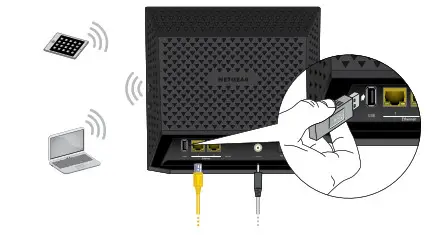
To access the USB drive from a Windows computer:
- Connect your USB storage device to a USB port on the modem router.
We recommend that you use the blue USB 3.0 port on the modem router to get the best USB device access speed. - If your USB storage device uses a power supply, connect it.
You must use the power supply when you connect the USB storage device to the modem router.
When you connect the USB storage device to the modem router’s USB port, it might take up to two minutes before it is ready for sharing. By default, the USB storage device is available to all computers on your local area network (LAN). - On a Windows computer that is connected to the network,
select Start > Run, enter \readyshare in the dialog box, and click the OK button.
A window displays the files and folders on the device.
To access the USB drive from a Mac:
- Connect your USB storage device to a USB port on the modem router.
We recommend that you use the blue USB 3.0 port on the modem router to get the best USB device access speed. - If your USB storage device uses a power supply, connect it.
You must use the power supply when you connect the USB storage device to the modem router.
When you connect the USB storage device to the modem router’s USB port, it might take up to two minutes before it is ready for sharing. By default, the USB storage device is available to all computers on your local area network (LAN). - On a Mac that is connected to the network, launch Finder and select Go > Connect to Server.
The Connect to server window displays. - Enter the smb://readyshare in the Server Address field and click the Connect button.
- When prompted, select the Guest radio button.
- If you set up access control on the modem router and you allowed your Mac to access the network, select the Registered
User radio button and enter admin for the name and password for the password.
For more information about access control, see the user manual, which is available online at downloadcenter.netgear.com or through a link in the modem router’s user interface. - Click the Connect button.
A window displays the files and folders on the device.
You can connect a USB printer to a USB port on the modem router and print wirelessly.
- Connect the USB printer to a USB port on the modem router with a USB printer cable.
- On each computer that will share the printer, do the following:
a. Install the current USB printer driver software (available from the printer manufacturer).
b. Download the NETGEAR USB Control Center utility from www.netgear.com/readyshare and install it.
c. Select the language. - If prompted, select the printer and click the Connect button for each computer.
When the first computer connects, the status changes to Manually connected by <device name>, in which <device name> is the device name of the computer.
For each computer, when you complete Step 3, the printer status displays as Available.
Support
Thank you for purchasing this NETGEAR product. You can visit www.netgear.com/support to
register your product, get help, access the latest downloads and user manuals, and join our
community. We recommend that you use only official NETGEAR support resources.
Trademarks
© NETGEAR, Inc., NETGEAR and the NETGEAR Logo are trademarks of NETGEAR, Inc.
Any non‑NETGEAR trademarks are used for reference purposes only.
Compliance
For the current EU Declaration of Conformity, visit:
http://support.netgear.com/app/answers/detail/a_id/11621/.
For regulatory compliance information, visit:
http://www.netgear.com/about/regulatory/.
See the regulatory compliance document before connecting the power supply.
